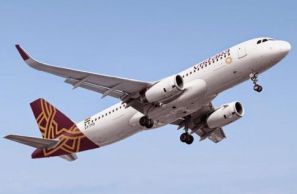Compared with Vistara, the performance of AirAsia, another new player in Indian skies that launched operations in June, was much better.
 Vistara, the full-service joint venture between Tata Sons and Singapore Airlines that launched its service on January 9, flew with more than half its seats vacant in the first month, show Directorate General of Civil Aviation data.
Vistara, the full-service joint venture between Tata Sons and Singapore Airlines that launched its service on January 9, flew with more than half its seats vacant in the first month, show Directorate General of Civil Aviation data.
Also, after years, the market share of domestic airline SpiceJet in January slipped into a single digit, 9.4 per cent, thanks to recent financial crises.
Vistara reported a passenger load factor (PLF, or an indicator of occupancy) of 45.4 per cent, substantially lower than other airlines, more so when compared with other full-service peers.
Jet Airways’ PLF stood at 87 per cent, while Air India had 82.4. The highest in the month, of 87.4 per cent, was reported by JetLite, subsidiary of the Naresh Goyal-controlled Jet Airways.
Compared with Vistara, the performance of AirAsia, another new player in Indian skies that launched operations in June last year, was much better.
AirAsia India in January reported a PLF of 76.3 per cent, slightly lower than the 80 per cent achieved the previous month.
Vistara operates on the Delhi-Mumbai, Delhi-Ahmedabad and Mumbai-Ahmedabad routes.
Since February 16, it has increased frequency on the Delhi-Mumbai route to five flights a day.
Budget 2015: Complete Coverage
The company, however, has said its PLF is satisfactory, given that Vistara is only a month old in business and ran with a schedule ready only up to February 15, the fog season.
It was because of this uncertainty that it could not advertise its schedules, it claims.
The company says its launch time was not perfect, as most passengers had already booked tickets, and travel agents were busy completing their sales targets for other airlines, rather than pushing a new one.
Also, premium-economy seats are a new concept and need to be pushed to corporate clients, and that can only be done with enough flights in the network.
A spokesperson for Vistara said: “We started bookings towards the end of the holiday season, after a majority of Indian holiday travellers had booked their tickets, and when business travel was curtailed. . . Our pricing strategy has been disciplined, and we choose not to engage in unsustainable rock-bottom sales.
“With business travel back to normal, we have seen the market picking up and demand growing, steadily.
“We opened our flights for ticket sales on December 19, 2014, and our schedule then was published only up to February 15, the end of the fog season.
“So, given limited inventories and short lead time for sales, our load factors were affected. Now, we have added more flights from February 16 and tickets for these will be sold till the end of the summer schedule in October, enabling customers to book in advance.
“This, coupled with some exciting product offers on the anvil, we believe coming months will see a definite improvement in our PLF.”
In January, domestic traffic grew 21.3 per cent over a year ago.
Domestic airlines flew 6.2 million passengers, compared with 5.1 million in January 2014.
IndiGo maintained its position as the largest domestic airline, with a market share of 36.4 per cent, while SpiceJet’s share (9.4 per cent) declined from 10.4 per cent in December 2014.
The Jet Airways-JetLite combine increased its market share to 24.1 per cent from 23.1 per cent the previous month, while Air India’s share stayed stable at 18.7 per cent.
When Vistara announced their launch, the total daily seats deployed by all airlines in the Indian domestic market were around 265,000.
Of these, around 9,000 (or 3.3%) were estimated to be business-class seats.
Vistara had been clear from the outset that they are focussing on building a service differentiation rather than on price.
Typically, this strategy does take a bit of time to play out.
Also, the launch did not give sufficient time to stimulate advance purchase since they opened with a three-week booking window.
“And, given the three-class strategy, we feel there could be a market (corporate travel and individual high-end leisure segment) that would see value in this offering in the long run,” said Samyukth Sridharan, president, Cleartrip.











